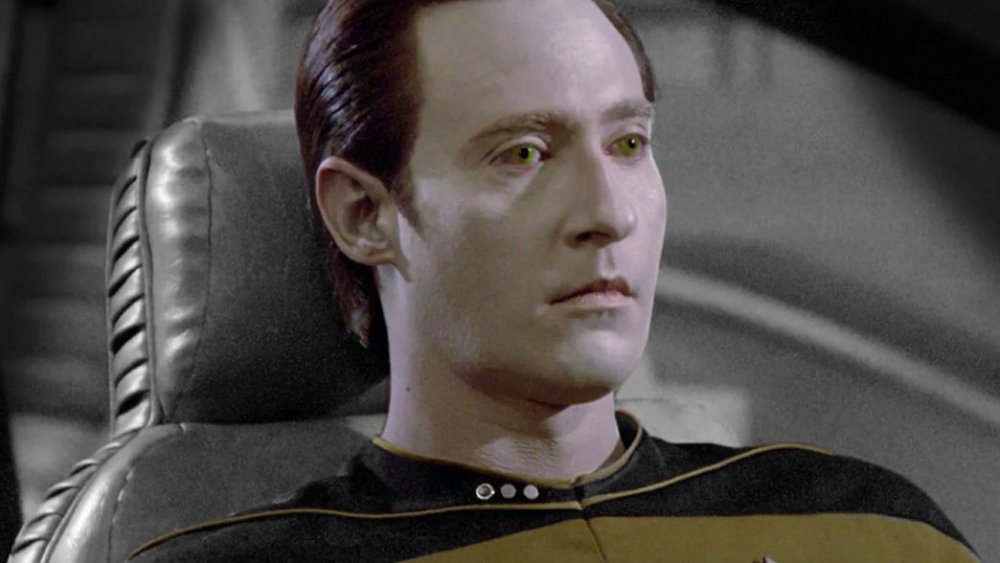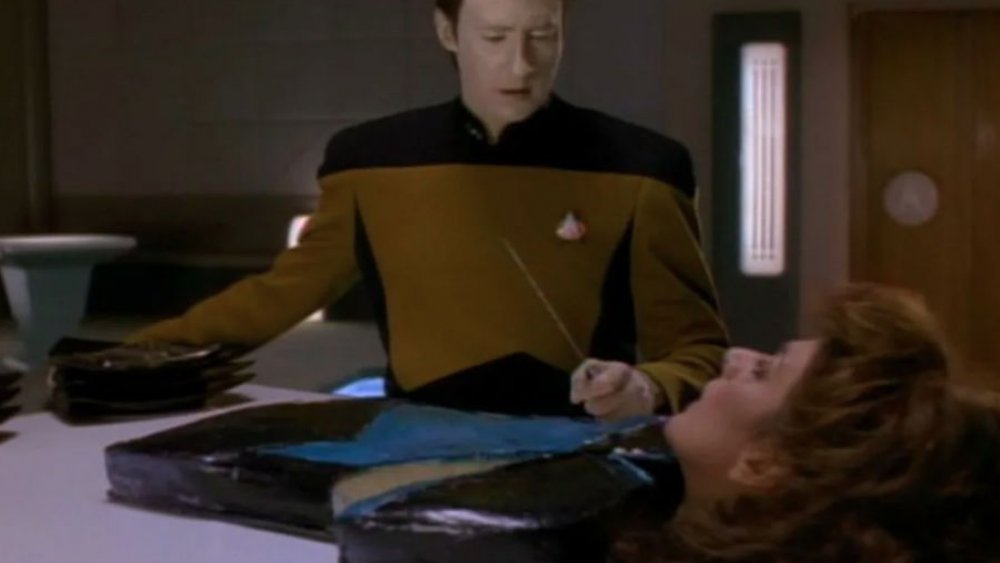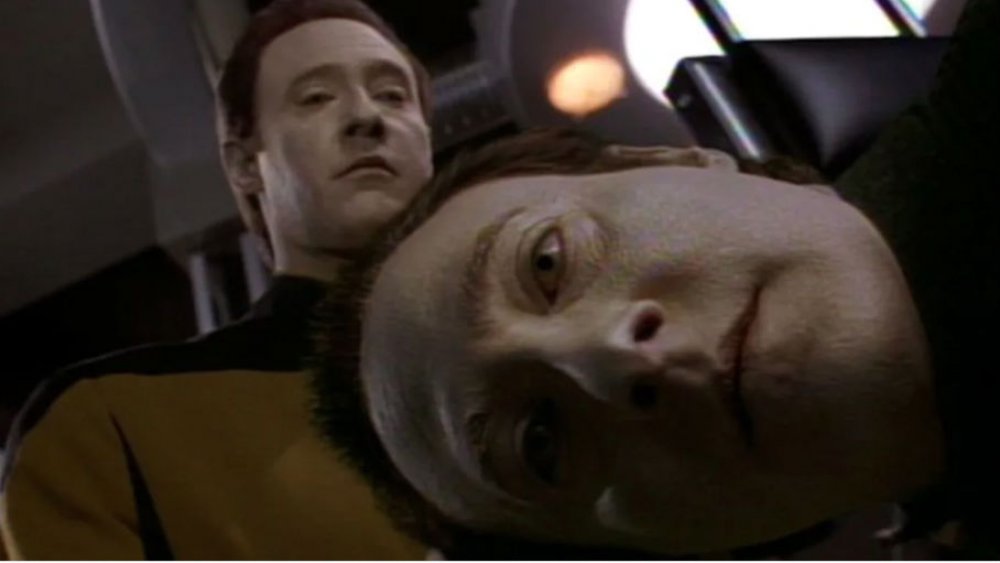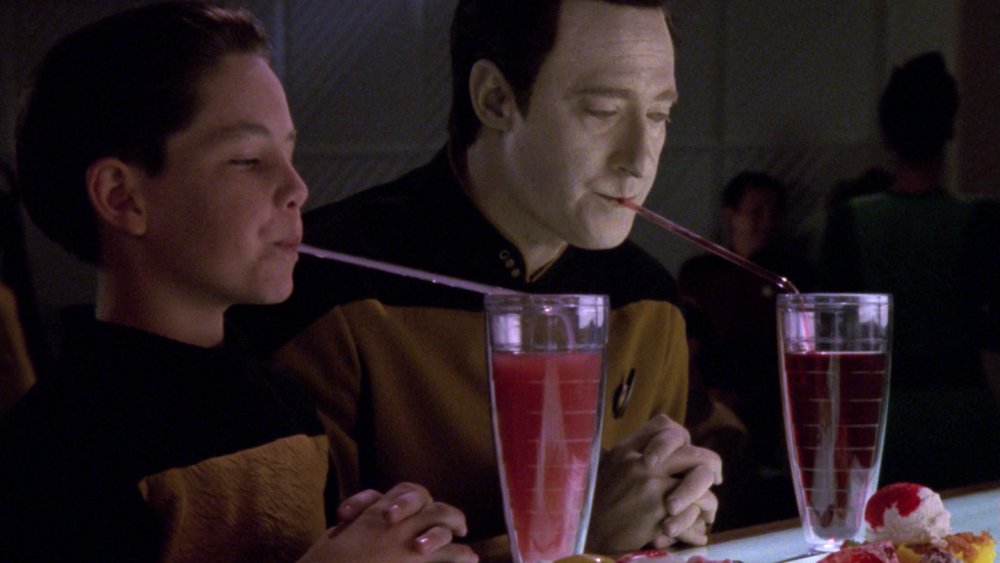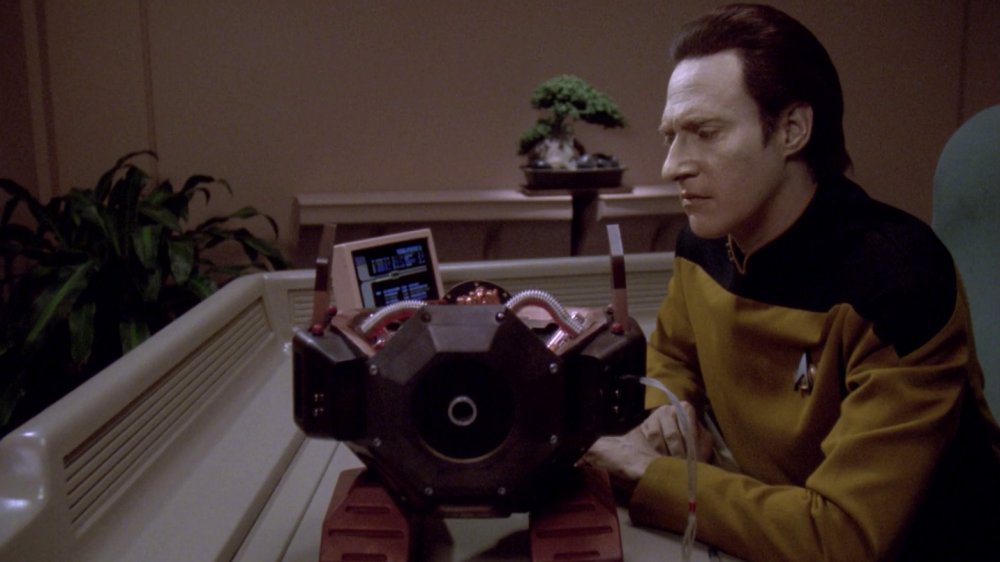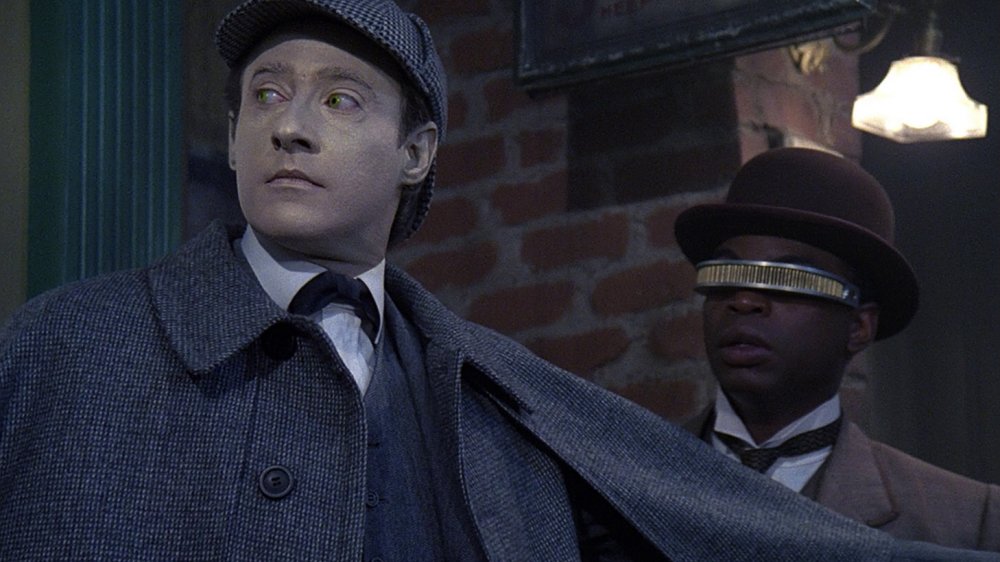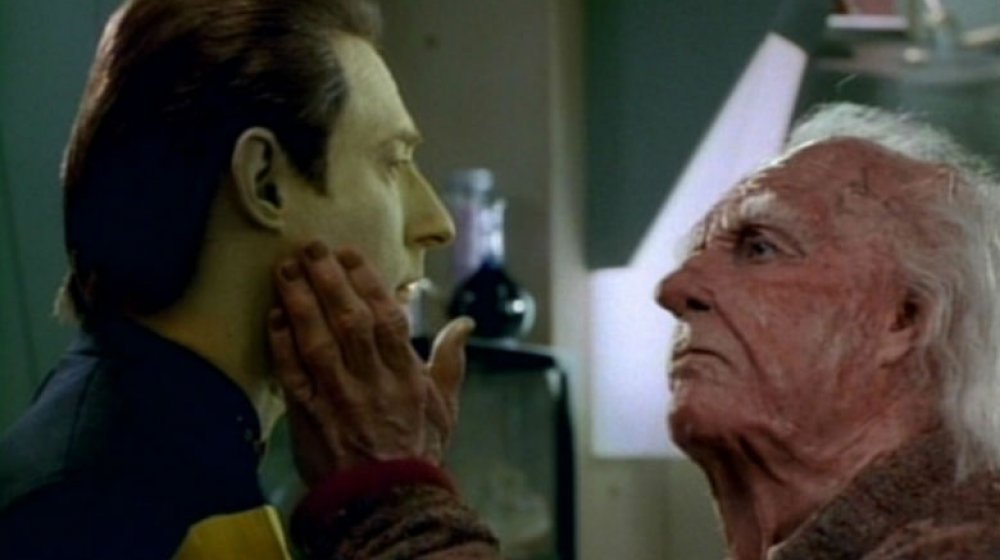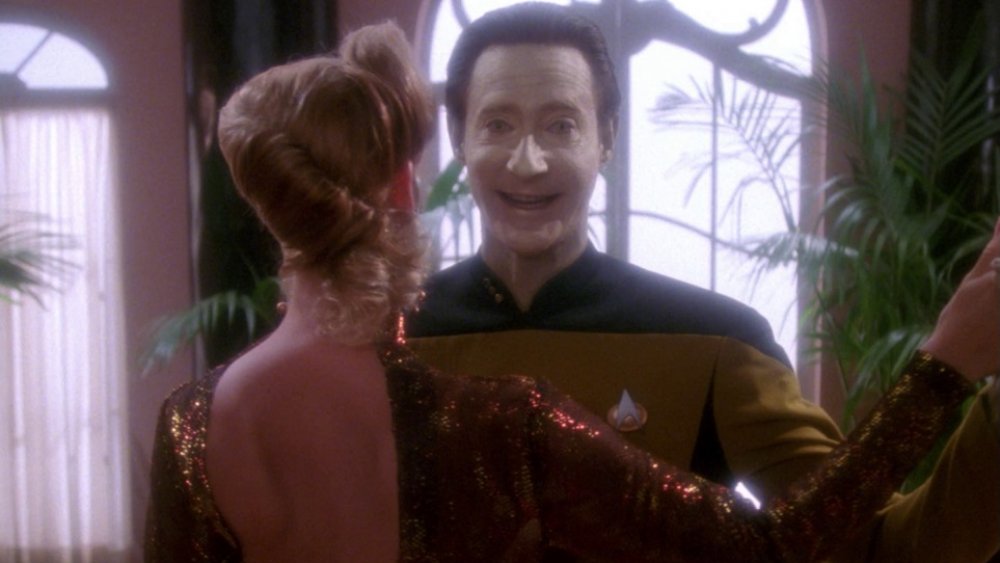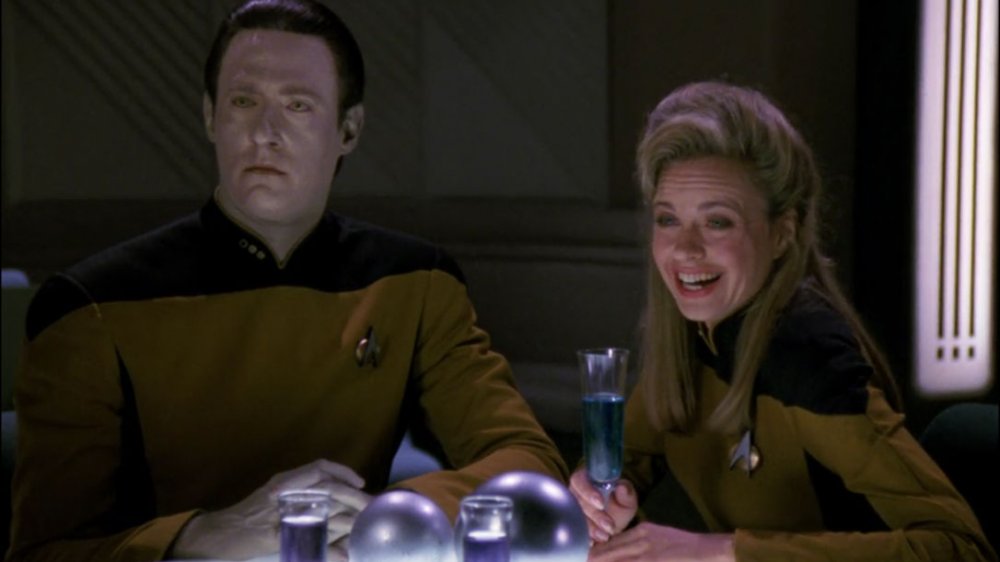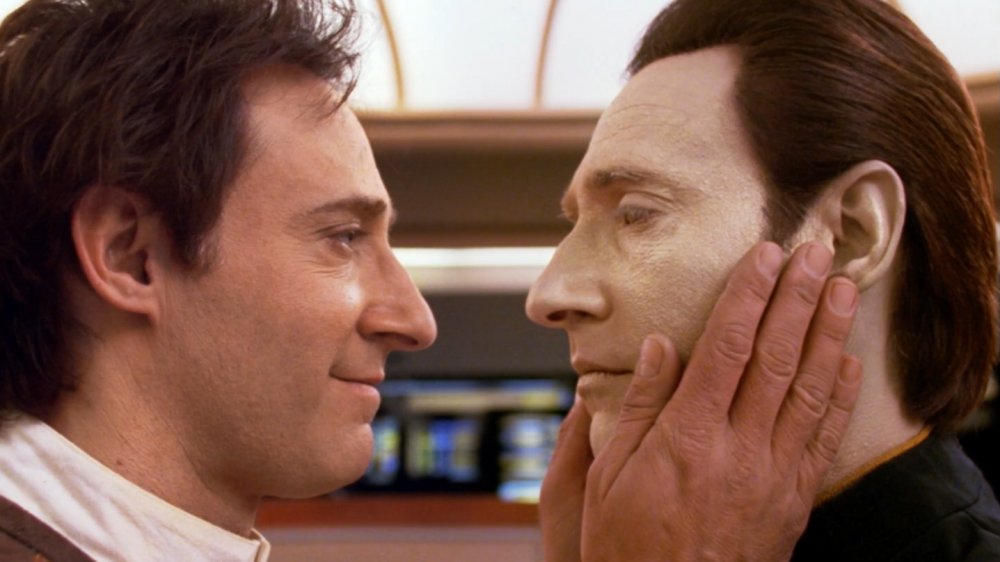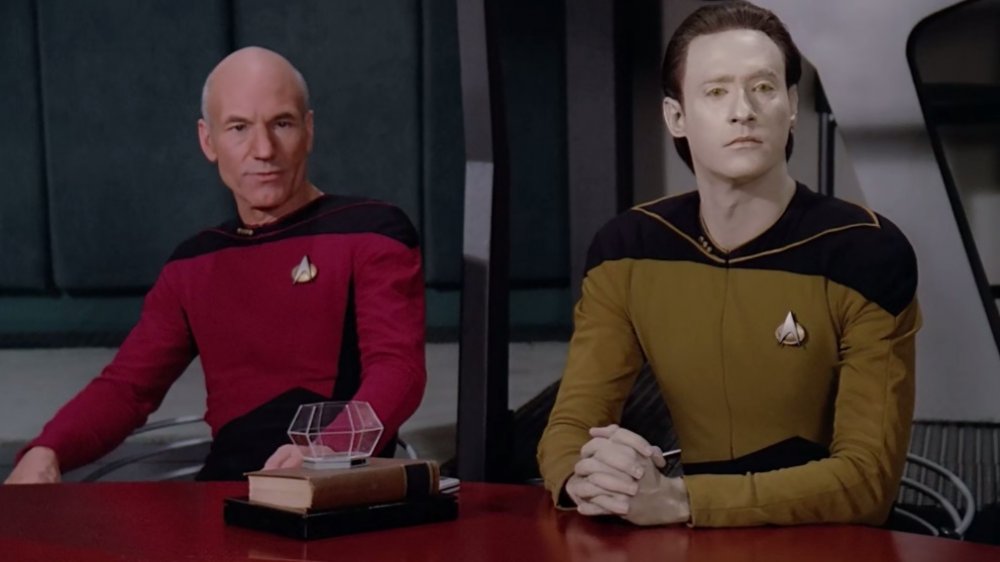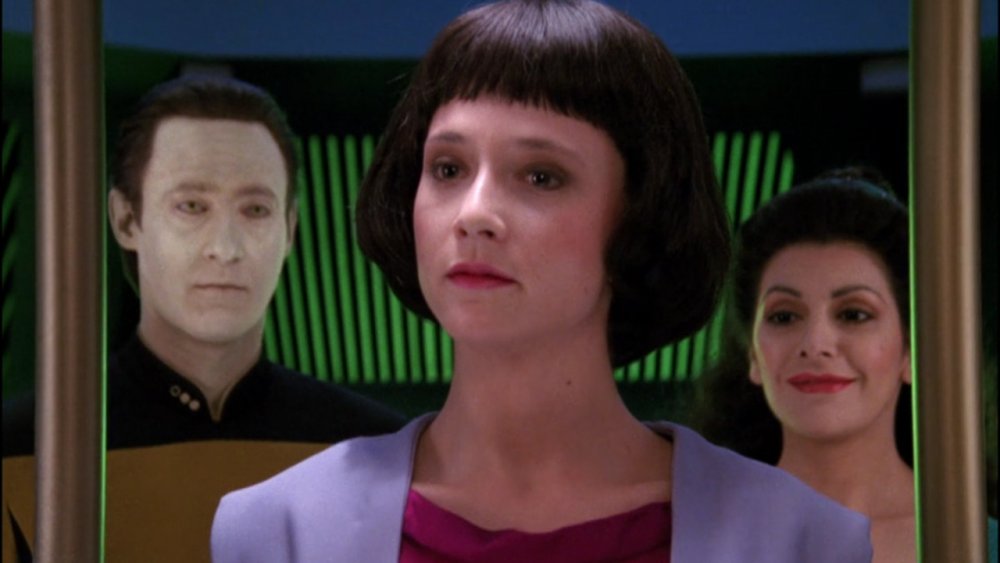The Best Data Episodes Of Star Trek: The Next Generation
You can't really talk about Star Trek: The Next Generation (TNG) without talking about Data. Played by Brent Spiner, this sentient android appeared in all seven seasons of the series, has a recurring role in Star Trek: Picard, and showed up in all four TNG films. Data proved to quickly be one of the most popular TNG characters, as fans enjoyed following the synthetic officer's struggles to understand humanity and grow closer to it.
As for his backstory, Data is discovered before the events of the series on the otherwise lifeless Omicron Theta colony. About halfway through the first season of TNG, in "Datalore," we learn most of the colony was wiped out by a powerful spacefaring being known only as the Crystalline Entity (take Galactus, but make him look like a giant snowflake). Fortunately, the android is rescued by Starfleet, which heavily influences his choice to join the organization. On board the Enterprise, Data regularly proves to be one of the crew's best assets, though occasionally his android origins allow villains to turn him into a crippling liability.
Throughout the series, most of the crew's senior officers were the focus of at least a couple of episodes, but Data's struggles and adventures proved compelling enough to fans that the Enterprise's own Pinocchio could rightly be accused of hogging the spotlight. And today, we're going to look at the episodes where Data shined the brightest. Here are our picks for the best Data episodes of Star Trek: The Next Generation.
'Phantasms' is one of Data's weirdest and funniest episodes
In 1968, Philip K. Dick penned one of his best-known novels, one where the title poses an interesting question: Do Androids Dream of Electric Sheep? Well, after watching the 1993 TNG episode "Phantasms," we can't tell you if androids dream of electric sheep, but we can report they occasionally dream of cakes made of out of crew members.
In season six's "Birthright," Data discovers a program that allows him to dream. And in the following season's "Phantasms," Data's dreams haunt him to the point where he appears to be losing his positronic marbles. His dreams are filled with absolutely bizarre images. For example, in one, he finds in a party on Ten Forward in which Deanna Troi (Marina Sirtis) is a cake whom his crew members are devouring. We eventually learn the weird dreams are actually giving Data the key to save the Enterprise. After the ship takes on a brand new warp core, invisible parasites start feeding on the crew. Data unconsciously detects the creatures, and the strange imagery of his dreams is actually designed to alert him of the danger.
"Phantasms" goes into weird Twin Peaks territory that no one ever expected from Star Trek, and for that alone, it deserves a spot on this list. But the episode also proves to be one of the funniest TNG stories, particularly with some uncharacteristic off-color humor that begins to surface after Data discusses his dreams with a holographic version of Sigmund Freud (who had a reputation for linking most neuroses to sex).
'Descent' puts Data against two of Star Trek's best villains
Two of TNG's most compelling bad guys form something of an alliance in the two-parter "Descent." And this terrifying union starts early in part one, when Data surprises us by getting murderously enraged when attacked by Borg drones — to the point that he continues to beat on an already dead drone when he should be helping out his crew members.
Data is puzzled by the spontaneous burst of emotion and concerned with his homicidal urges, and we eventually learn he's being manipulated by his brother Lore, a predecessor to Data who's programmed with emotions but suffers mental instability. Lore is gathering Borg drones detached from the Borg Collective and recruiting them into a cult committed to the rise of cybernetic beings over organic life. To this end, Lore is behind Data's murderous emotions, and he manipulates him to the point where he's almost willing to kill his best friend, Geordi (Levar Burton).
Bookending the penultimate and final seasons of TNG, "Descent" not only gives us another chance to see the Borg, but it also marks the return of the free-thinking Borg Hugh (Jonathan Del Arco) who first appeared in "I, Borg." It also proves to be the final confrontation between Data and his twisted brother Lore. It's as sad as it is satisfying when Data deactivates his wayward sibling, whose final profession of love before his death is almost certainly a lie.
'Hero Worship' explores the pros to being an android
When you first discover how badly Data wants to be a human, it's natural to at least briefly wonder why he would want to be something that — in so many ways — is inferior. That's part of what occurs to the young Timothy (Joshua Harris) in the season five episode "Hero Worship." Timothy is the sole survivor of the wrecked ship Vico, and it's Data who saves him. Traumatized by so much death, Timothy takes comfort in pretending to be an android. Counselor Troi encourages Data to help Timothy find shelter in this temporary fantasy, and he teaches the boy what it's like to be a synthetic person, including finding Timothy appropriate clothes and combing his hair to look more like Data.
Data's time with Timothy is touching and bittersweet. We can tell from the beginning that Data enjoys the company of someone who wants to be more like him and that he'll miss Timothy when, inevitably, he emerges from the fantasy. Regardless, the exercise helps the boy open up to his rescuers. Timothy initially tells the Enterprise crew that his ship was attacked by aliens, but by the end, it comes out Timothy wrongly blames himself. Moments before the ship's destruction, Timothy fell and hit a console, and he erroneously believes that whatever he hit on the console is what destroyed Vico. But in a nice twist, it's Timothy's memory of the Vico's final moments that gives Data the clues he needs to save the Enterprise from the Vico's actual fate.
'The Quality of Life' asks some heavy questions
"The Quality of Life" is unique in that it puts Data at odds with his shipmates, but it's not because any villain infiltrates his positronic net. Instead, Data refuses the orders of a superior officer on his own free will.
Early in "The Quality of Life," we meet Dr. Farallon (Ellen Bry), the head of a project she hopes will be approved by the Federation. To help with her work, Farallon creates small, mobile, problem-solving machines called exocomps. After one of the exocomps refuses to perform a task, Data — while everyone else assumes the exocomp is malfunctioning — determines the machine is self-aware. Toward the end of the episode, Data locks horns with Riker over using the exocomps to save Picard (Patrick Stewart) and Geordi from an accident but in a manner that would destroy the machines. Riker solves the problem by suggesting that Data ask the exocomps to help rather than ordering them. The machines agree to help, and they find an alternative means of saving Picard and Geordi, though sadly one of them chooses to sacrifice itself for the sake of the others.
"The Quality of Life" is an episode that challenges its audience. It doesn't take much to feel sympathy for Data. He may be a machine, but he looks like a person and is being played by a flesh-and-blood human. It's quite another thing to root for Data when he's treating the rights of three drone-like machines as inviolate enough to risk the lives of beloved regular characters.
'Elementary, Dear Data' is The Next Generation having a whole lot of fun
Picard loves his Dixon Hill, and Data loves Sherlock Holmes. And in "Elementary, Dear Data," we get to see Data indulge in his love for Sir Arthur Conan Doyle's iconic detective, while Geordi LaForge plays his loyal companion, Watson.
It begins, as most holodeck-gone-wrong episodes do, with the heroes just having a bit of fun. Geordi gets frustrated when Data, rather than going through an entire Holmes mystery, ends the story early by revealing the killer. Only instead of using deduction, Data knows who committed the crime simply by having read the story already. Dr. Pulaski (Diana Muldaur) gets involved when she overhears the two in Ten Forward, and she challenges Data to solve an original Holmesian mystery. That challenge inadvertently leads Geordi to give the holodeck a command that makes the holographic version of Holmes' nemesis, Professor Moriarty, sentient. And soon enough, the classic bad guy becomes aware he's a hologram on a space ship.
Once the challenge gets interesting, Data and Geordi throw themselves into their roles, and their enthusiasm is infectious. But what makes the episode one of the TNG's most memorable is Daniel Davis' portrayal of Moriarty. Picard is forced to get involved after Moriarty figures out a way to briefly take control of the Enterprise. However, Moriarty's evolution makes him much more than a villain, and his portrayal is surprisingly affecting. When Moriarty tells Picard, "What I have seen, what I have learned, fascinates me — I do not want to die," it takes you off guard. Against all odds, you actually care about this holographic recreation of a Victorian-era villain.
Brent Spiner shows off his acting chops in 'Brothers'
When Data's twin brother Lore threatens the Enterprise, Brent Spiner does double-duty by playing both androids. But in the fourth season episode "Brothers," Spiner does triple duty as Data, Lore, and their enigmatic creator, Dr. Noonian Soong.
In "Brothers," Dr. Soong activates a homing device that summons both Data and Lore to his workshop deep in the jungle of an otherwise seemingly unpopulated planet. Soong is dying, and before his passing, he wants to give Data a chip he's developed that will give Data human emotions but without the flaws that lead to Lore's instability. Before Lore's predictable betrayal and Soong's death, we learn much of what Lore told us in the earlier episode "Datalore" was untrue. In particular, while Lore claims to be a perfected version of Data, Soong reveals Lore was built first and was deactivated because humans feared him. Data seems genuinely stunned to learn he isn't inferior to Lore, so much so that he repeats the revelation "I am not less perfect than Lore" out loud, much to his brother's aggravation.
Spiner's performances in all three roles genuinely feels like a troubled family reunion. Data and Lore come off like two feuding brothers under the tutelage of an impatient father, including in the perfectly touching and funny moment when Soong orders them through clenched teeth to both sit down. "Brothers" is a testament to Spiner's acting abilities, and the episode is an essential piece of the puzzle when it comes to understanding Data.
'Data's Day' lets us look through the android's eyes
The plot of season four's "Data's Day" isn't particularly memorable. Data prepares for the wedding of Chief O'Brien (Colm Meaney) and Keiko (Rosalind Chao), while the Enterprise heads for the Romulan Neutral Zone with a Vulcan ambassador in tow. Really, "Data's Day" is pretty much a meat-and-potatoes TNG episode, but it's elevated by being told completely through Data's adorably hopeless point of view
"Data's Day" references the episode "The Measure of a Man," with Data writing a letter to Bruce Maddox, the same cyberneticist who caused the android so much trouble in the earlier story. Data writes his letter as a log entry, explaining everything that's happening, what he believes will resolve each situation, and inevitably how laughably wrong he proves to be. For example, Data tries and fails to understand the drama between O'Brien and Keiko when the latter gets cold feet and cancels their wedding. And the eventual betrayal by the Vulcan ambassador, who proves to be a Romulan incognito, seems almost unnecessary compared to the fun of Data learning to dance while wearing a Joker-like smile that is the stuff of nightmares.
"Data's Day" is equally sweet, sad, and funny in showing us Data's attempts to understand human behavior. One interesting aspect of the episode is when he describes Worf (Michael Dorn) as a "kindred spirit." With both often finding themselves confused by humans, the connection makes sense. Still, with both taking vastly different approaches to most situations, it's a surprising revelation.
'In Theory' is a heartbreaking Star Trek episode
In the early first season episode "The Naked Now," Data famously gets intimate with Tasha Yar (Denise Crosby). After that, Data doesn't have a lot of chance at romance until the fourth season's "In Theory."
As Data's friend Jenna (Michele Scarabelli) is getting over a break-up with an on-again/off-again boyfriend, it suddenly occurs to her that her synthetic buddy might just be her best new candidate for romance. As Jenna's interest gradually becomes clear to Data, he goes to each of his Enterprise friends in turn, asking their advice. He decides to move forward with the relationship and creates a program for it. Slowly, Jenna begins to realize that having a romantic relationship with an emotionless android means ... having a romantic relationship with an emotionless android. Data never knows how to react to what Jenna does, whether it's what to do when she brings him a gift or when he abruptly initiates a lovers' quarrel simply because he thinks that's what Jenna wants.
The episode's final scene is gut-punching. Once Jenna tells Data their relationship is over, he responds emotionlessly with, "Then I will delete the appropriate program." Jenna is crushed while Data seems perfectly fine, as untroubled by the break-up as if it'd never happened. Most Data episodes end with some kind of sentiment hinting towards Data being more human than he appears. "In Theory" swerves hard in the other direction, letting you viscerally feel the impact Data's lack of humanity can have on those around him.
Data goes looking for his father in 'Birthright, Part I'
As far as TNG two-parters go, season six's "Birthright" is a little different than most. "Birthright, Part I" is maybe 60 percent Data and 40 percent Worf, with the Klingon officer dealing with the reveal that his father Mogh — long presumed dead — may still be alive. In the meantime, Data is gifted with a strange dream-like vision of his father, Dr. Soong, after an accident involving Geordi, Dr. Bashir (Alexander Siddig) of Deep Space Nine, and a mysterious device found in the Gamma Quadrant.
Data and Worf's narratives come together when Data tells the Klingon about this experience, and Worf sees the event as a powerful vision. Taking Worf's advice, Data does everything he can to interpret his vision. At first, he tries to read his dream through art and is inspired enough to create dozens of paintings, many of which include images that Data didn't even see in his vision. Eventually, he recruits Geordi and Bashir to help recreate the accident that caused it in the first place so he can experience the vision in its entirety.
The result is a powerful, tear-jerking reunion with Data's father, albeit not "in the flesh." By recreating the accident, Data unlocks a program that his father had set to be activated when Data reached a specific point in his evolution. As a result, Data not only gets to see and speak to his dead father, but he leaves the experience with the newfound ability to dream.
'The Measure of a Man' is Star Trek: The Next Generation at its finest
Among the first two seasons of TNG, few episodes are as impressive as "The Measure of a Man," in which Data finds himself on trial for his life — not for a crime but simply for being.
Starfleet scientist Bruce Maddox (Brian Brophy) wants to perform experiments on Data, but Data is worried he won't survive them. When Maddox forces the issue, Data tries to resign his commission. Maddox argues Data is Starfleet's property and doesn't have the right to resign his commission, so Picard is forced to face-off against Riker in a legal proceeding to determine whether or not Data has sentience. He famously tells the judge, "Your Honor, Starfleet was founded to seek out new life." Then, pointing to Data, he says, "Well, there it sits."
Perhaps even more powerful is Data's defense. When Maddox visits Data's quarters in hopes of convincing him to submit to his experiments, Data tells him, "When Doctor Soong created me, he added to the substance of the universe. If, by your experiments, I am destroyed, something unique, something wonderful, will be lost. I cannot permit that." The lines' power comes from the fact that they're spoken by Data. If a human being were to describe themselves as "something unique" or "wonderful" that must be protected, it might come off as sappy or even self-important. Coming from an android without emotion to corrupt his logic, it seems like nothing but the wisdom it is.
'The Offspring' is definitely Data's saddest episode
If "The Offspring" doesn't make your eyes sweaty, nothing will. The emotions all start when Data builds an android that he names Lal (Hallie Todd). As Picard predicts, Lal's creation attracts all the wrong kind of attention. Starfleet Admiral Haftel (Nicolas Coster) makes it clear he wants Lal to be supervised by Starfleet scientists, while Data is adamant that he will keep his daughter with him.
Lal's time aboard the Enterprise is marked by the same kind of well-intentioned confusion we're used to from her father. Unaware school children are laughing at her, Lal determines that because they laugh so much, she must have "mastered" the concept of humor. She then agrees to work in Ten Forward with Guinan (Whoopi Goldberg) in an attempt to learn human behavior. Lal becomes something of a child to the entire crew, making her loss that much tougher to handle. Lal experiences intense emotion at the prospect of being taken away from her father, and it triggers a cascade failure. Data races to save her with such determination that even Admiral Haftel is struck by it, but in the end, Lal can't be saved. She thanks Data for her life and tells her father, since he can't feel love, that she will love for them both.
Having transferred Lal's memories into himself, Data assures the heartbroken crew, "She is here," and then points to his head. Unwilling to allow her fade into oblivion, Data keeps her memories in his positronic net so she'll always be with him. That right there is a truly tear-jerking Star Trek moment, and if you're not weeping, then you're probably an android.
